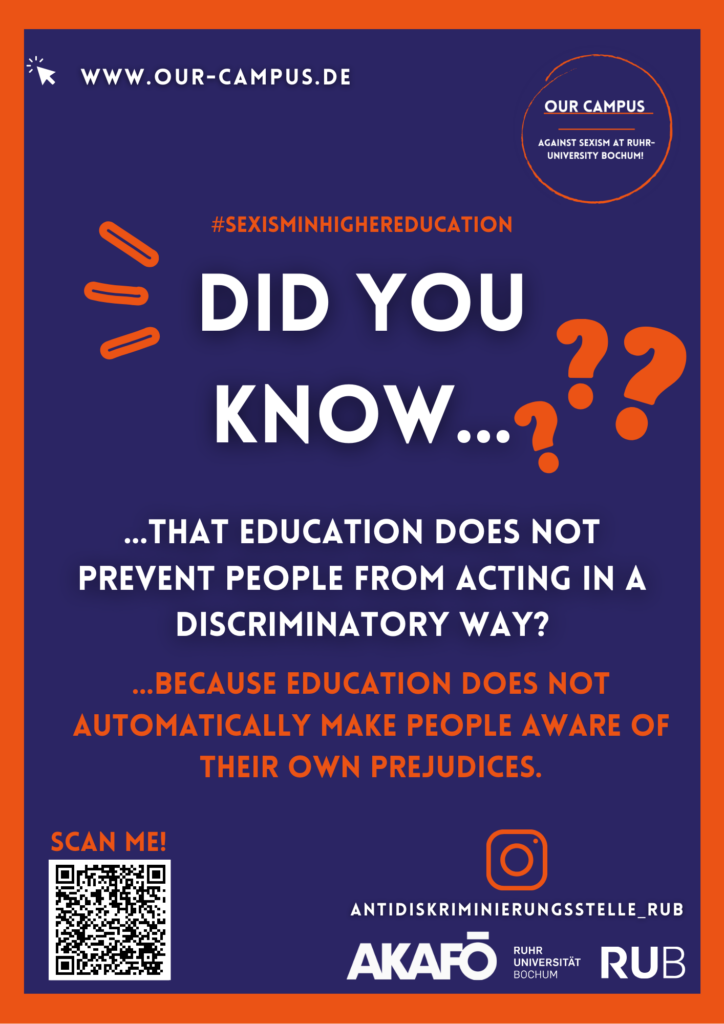
The campus is a space where a wide variety of people come together to work, learn and live among each other. The Ruhr-University and the campus as a place of learning is open to all people – regardless of social and cultural background, religious affiliation, sexuality, gender identity, political orientation, appearance, etc… It is important for good co-operation that we meet without being biased.
But did you know that many of our stereotypes and prejudices have been taught to us since childhood and that we first have to unlearn them in order to think and act in a way that is sensitive to discrimination?
This learning of unconscious patterns of judgement and perception, which affect us all and arise through experience, media imprinting and personal experiences, is called unconscious bias (also: implicit bias). These lead to hasty judgements about people and situations, which on the one hand relieve us mentally, as they enable routine actions, but on the other hand also lead to minorities being systematically discriminated against.
People have prejudices because they basically serve to orientate themselves quickly. However, unconscious prejudices can lead to managers selecting people who are more similar to themselves, for example in application processes. This dynamic has the effect that certain groups are hired or promoted and are more privileged than others. In such cases, these stereotypes and internalised prejudices distort reality and thus the living conditions of many people.
A study conducted at RUB in 2023 revealed that 14.69% of the students who took part in the study regularly experience discrimination during their studies at RUB. These results contradict the self-perception of universities as ‘enlightened organisations’[1], i.e. as organisations whose members cannot be affected by discrimination, as all members of the university have a certain level of education. However, due to our internalised stereotypes and prejudices, education does not automatically protect us from (unconsciously) behaving in a discriminatory manner if we do not deal with it ourselves, i.e. with topics such as unconscious bias, critical whiteness and intersectionality
In order to break down these stereotypes and prejudices and prevent such situations, you have to deal with your own unconscious beliefs and prejudices (unconscious bias), unlearn these thought patterns and structures and train new attitudes and behaviours.
But how can I do this?
The first step is to accept that you have such thought patterns and stereotypes and then to identify them. This includes becoming aware of your own privileges and developing mindfulness for your own prejudices and privileges and their effects. It is also important to look at where the source of these prejudices and stereotypes lies and what experiences we have had and what ideas of normality we have learnt. In order to unlearn these, it helps above all to gather knowledge, reflect on ourselves and thereby broaden our own perspectives. Self-reflection, privilege checks and recognising our own prejudices form the basis for actively developing ‘counter-thinking’, i.e. working specifically against our own stereotypes and prejudices and rethinking or dissolving them
The RUB Anti-Discrimination Office regularly offers workshops and further education programmes for various (status) groups. We at OUR CAMPUS would like to use our awareness campaign, among other things, to draw attention to the fact that discrimination based on unconscious biases (e.g. lecturers asking students ‘where they really come from’…) occurs across all status groups. OUR CAMPUS wants to help more people in university contexts to identify and unlearn their unconscious biases and thus behave more appropriately towards their fellow human beings as well as contribute to reducing structural inequalities.
Ruhr-Universität has also published an entire website with further information and a free self-study course, which you can find here.
Read more here:
Wondrak, Manfred: Errors in thinking! Wie Unconcious Bias entstehen, published at: https://www.anti-bias.eu/wissen/entstehung-von-bias/denkfehler-wie-unconscious-bias-entstehen/ , 2020. (accessed on 11 November 2024).
Information on unconscious bias and stereotypes from the University of Bonn (accessed on 11 November 2024).
Domsch, M.E. et al: UNCONSCIOUS BIAS – An introduction to prejudice in working life, in: Domsch, M., Ladwig, D., Weber, F. (eds.): Vorurteile im Arbeitsleben, Springer 2019, pp. 3-20.
Völkle, H.: Unconscious Bias: Unbewusste Vorurteile erkennen und verändern, in: Huch, S. & Erlemann, M. (eds.): Gender & Diversity Studies in MINT meets Naturwissenschaftsdidaktik. Edition Fachdidaktiken. Springer 2024, pp. 193-207.
Anti-Bias-Netz (ed.): Prejudice-conscious changes with the anti-bias approach, Lambertus 2021.
[1] After H. Pantelmann and S. Blackmore (eds.), Sexualised Harassment, Discrimination and Violence in the Higher Education Context. Challenges

